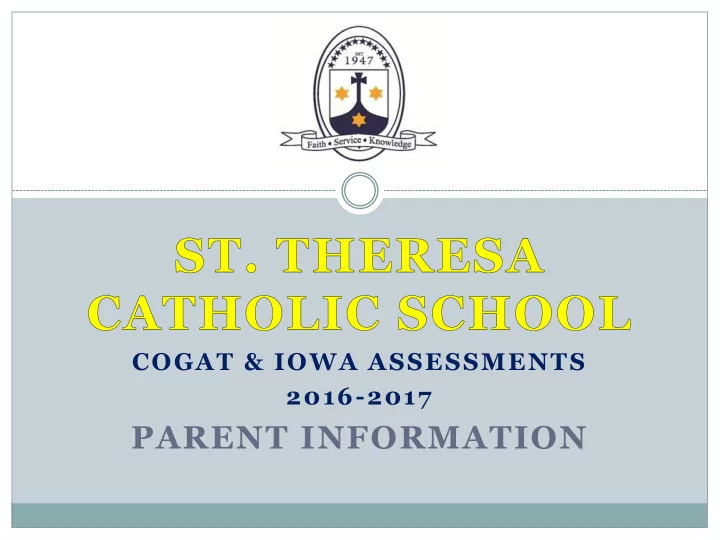

COGAT & IOWA ASSESSMENTS 2016-2017 PARENT INFORMATION
Testing dates Purpose, Importance, and Benefits of the CogAT – Cognitive Abilities Test & Iowa Test of Basic Skills (ITBS) CogAT & Iowa Content Areas How is St. Theresa preparing the students? Tips for parents Test Results Q & A
STANDARDIZATION is key in standardized testing! CogAT and Iowa Assessments will only be administered: Monday, March 27 th – Friday, April 7 th Make-up testing will be limited to afternoons during this same testing window Make-up testing time will be reserved for EXCUSED absences ONLY
CogAT – Cognitive Abilities Test March 27 th – March 31 st Kindergarten – 7 th grade Iowa Test of Basic Skills (ITBS) April 3 rd – April 7 th Kindergarten – 8 th grade
CogAT – COGNITIVE ABILITIES TEST CogAT Tests student ABILITY Assesses the level of understanding, reasoning, and problem-solving skills of students in three different areas: 1. Verbal 2. Quantitative 3. Non-verbal http://www.riversidepublishing.com/products/cogAT7/lea rnmore.html
CogAT - (Cont’d) Results of CogAT are generally used to predict the success of students in school Helps teachers understand and adapt to their student’s needs CogAT does not gauge other factors like: -motivation -effort -work habits
IOWA TESTS OF BASIC SKILLS (ITBS) IOWA Measures basic skills Assesses student achievement and educational development Helps determine how students are performing on nationwide standards Helps teachers identify a student’s strengths and areas for growth Measures student annual growth and progress Helps teachers guide and plan instruction
ITBS – Content Area Kindergarten : Reading, Language, Vocabulary, Word Analysis, Listening, and Mathematics Grades First-Second : Reading, Language, Vocabulary, Word Analysis, Listening, Mathematics, Computation, Social Studies, and Science Third Grade : Reading, Written Expression, Conventions of Writing, Vocabulary, Word Analysis, Listening, Mathematics, Computation, Social Studies, and Science Grades Fourth-Eighth : Reading, Written Expression, Conventions of Writing, Vocabulary, Mathematics, Computation, Social Studies, and Science http://riversidepublishing.com/products/ia/learnmore.html
USING CogAT & ITBS TOGETHER Together: Comparing the CogAT and the ITBS can: help identify if a student is working to their ability level identify a student’s strengthens and weaknesses help teachers adapt instruction to fit student needs. This information enables teachers to provide every opportunity for each child’s success.
Miscellaneous Information All questions and answers (except for Reading Part 2) are read aloud by the teacher for Kindergarten students All questions and answers (except for Vocabulary and Reading Parts 1 and 2) are read aloud by the teacher for 1 st and 2 nd grade students All other grades (3 rd -8 th ) read all sections on their own
PREPARING STUDENTS Students have practiced test-taking strategies throughout the year Students will take practice CogAT and ITBS tests in the classrooms Teachers talk to their students about the upcoming tests Teachers and students discuss coping with anxiety and tips for being good test takers
Tips for Parents The best thing you can do as a parent: Provide positive support by expressing confidence in your child’s ability to do their best! Remind them that a test can be their chance to SHINE, but it’s also just a snapshot of how they perform on 1 day of their life.
Encourage your child to… Get plenty of rest each night Eat a good breakfast Relax… don’t fret, but try hard to do your best Listen carefully and follow directions Read directions and questions carefully Think before you answer Don’t rush… but be aware of how much time is left Try to answer EVERY question (best guess is better than a blank) Check over your work when finished
TEST RESULTS Test results will be distributed once we have received them. You can schedule a conference to discuss results with the teacher at that time.
Q & A Thank you for your time and continued support.
Recommend
More recommend